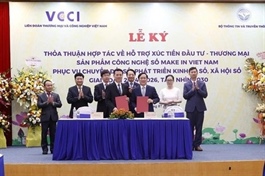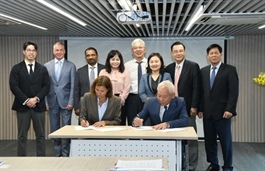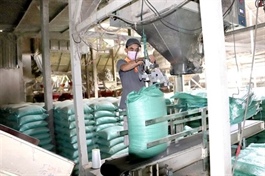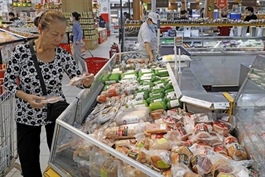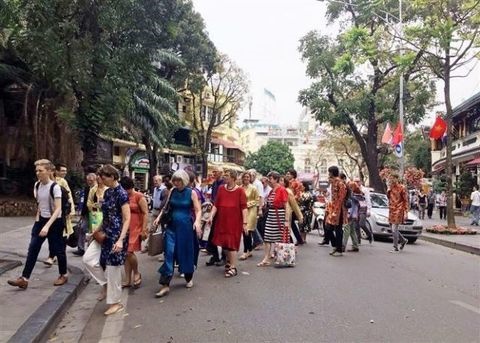Weak logistics infrastructure hinders trade in Southeast Việt Nam
Weak logistics infrastructure hinders trade in Southeast Việt Nam
The southeast region must enhance its logistics services, establish robust logistics companies to support import-export operations, develop high-quality brands, and promote regional trade, speakers said.
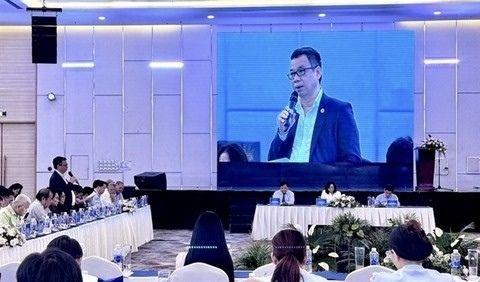
Speakers at a trade promotion conference held in HCM City on Wednesday. — VNA/VNS Photo |
Speaking at a trade promotion conference held in HCM City on Wednesday, experts recommended stakeholders in the region advocate for improvements in logistics systems to ensure the efficient and secure transportation of goods.
Numerous businesses in the region have expressed concerns over the inadequacies of logistics infrastructure and the rising costs associated with logistics activities.
These challenges have resulted in reduced storage durations for goods, leading to an increased incidence of product damage.
Nguyễn Văn Dũng, deputy chairman of HCM City’s People’s Committee, said businesses in the region should capitalise on the free trade agreements in which Việt Nam is a signatory.
They should also diversify markets and supply chains, he said.
It’s important to also enhance regional connectivity, which allows localities to leverage their inherent advantages in enhancing trade, he added.
The city is focusing on exporting to key markets, particularly those with which Việt Nam has established free trade agreements (FTAs), according to Dũng.
Đặng Phúc Nguyên, a representative from the Việt Nam Fruit and Vegetable Association, said that geopolitical conflicts have led to increased shipping costs and transit times for agricultural products.
He recommended businesses target nearby markets such as Japan, China, and South Korea.
Lý Kim Chi, chairwoman of the HCM City Food Association, also expressed concern over the insufficient availability of cold storage facilities, which adversely affects the food industry.
She said it was essential to prioritise training and developing human resources, as well as attracting talent and fostering innovation and creativity.
Phan Thị Thắng, deputy minister of Industry and Trade, said it was vital to enhance human resources to bolster the competitiveness of Vietnamese logistics companies.
The region has established itself as an economic leader and the foremost centre for trade, industry, tourism, and service development in Việt Nam.
This achievement is attributed to its natural advantages and its strategic, economic and political positioning.
The region has also emerged as an attractive destination for foreign investors and a promising area for the relocation and restructuring of supply chains.
Despite constituting only 7 per cent of the country’s total land area and 19 per cent of its population, the southeast region has contributed over 30 per cent of Việt Nam’s GDP, 38 per cent of total State budget revenue, and 32 per cent of total exports.
As part of the event, an exhibition showcased local products and facilitated trade connections between regional suppliers and import-export businesses.
The southeast region encompasses HCM City and five provinces: Đồng Nai, Bình Dương, Bà Rịa-Vũng Tàu, Bình Phước, and Tây Ninh, forming the country’s largest economic hub.
In May, Prime Minister Phạm Minh Chính approved the master plan for the development of the southeast region for the period of 2021-2030.
According to data from the General Department of Customs, the region’s import-export turnover in the first half reached $115.7 billion, accounting for 31 per cent of the nation’s total trade.
Exports from the region are present in nearly 200 countries and territories, primarily in markets with which Việt Nam has free trade agreements, including China, the EU, Japan, South Korea, and ASEAN nations.
Last year, this region’s growth was estimated to exceed 5 per cent, and it attracted nearly $11.4 billion in foreign direct investment (FDI), accounting for over 31 per cent of the country’s total FDI.
The event was co-organised by the Trade Promotion Agency under the Ministry of Industry and Trade and the HCM City People’s Committee.



